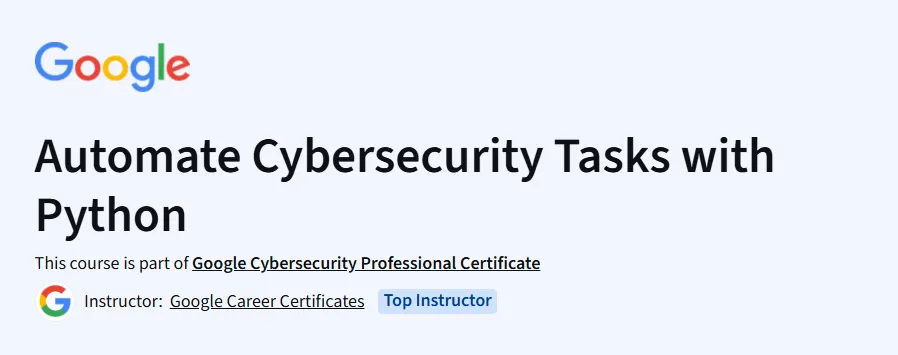What will you learn in Automate Cybersecurity Tasks with Python Course
Understand how Python enables cybersecurity automation through scripting basics like data types, loops, and conditionals.
Write user-defined functions, use modules, and apply script modularity and readability.
Work with strings, lists, regular expressions, and text parsing to extract security-relevant data.
Open, parse, and process log or config files for security purposes.
Apply debugging best practices to troubleshoot and strengthen security scripts.
Program Overview
Module 1: Introduction to Python
⏳ ~7 hours
Topics: Python data types, variables, control flow, conditionals, and looping.
Hands-on: Videos + readings; ~4 assignments; ~8 hands-on labs practice writing basic scripts.
Module 2: Write Effective Python Code
⏳ ~4 hours
Topics: Defining and invoking functions, built-in vs. custom modules, code readability.
Hands-on: 10 videos, 7 readings, labs to create and modularize functions.
Module 3: Work with Strings & Lists
⏳ ~3–4 hours
Topics: Manipulating strings/lists, pattern matching with regex.
Hands-on: Exercises building algorithms and extracting data with regex.
Module 4: Python in Practice for Security
⏳ ~4 hours
Topics: File handling, parsing text-based security logs, script debugging strategies.
Hands-on: Labs import and parse files, debug parsing logic, create security-related scripts.
Get certificate
Job Outlook
Prepares learners for roles like Cybersecurity Analyst, SOC Engineer, Automation Specialist, or Python Scripting roles in InfoSec.
Equips you for foundational scripting tasks common in pen testing, SIEM automation, and security operations.
Specification: Automate Cybersecurity Tasks with Python
|
FAQs
- No prior Python experience is needed.
- Starts with basics like data types, loops, and conditionals.
- Gradually introduces functions, modules, and script modularity.
- Hands-on labs reinforce practical coding skills.
- Designed for beginners aiming to automate cybersecurity tasks.
- Teaches automation for SOC tasks and security operations.
- Covers parsing logs, processing config files, and extracting security-relevant data.
- Introduces debugging and script strengthening techniques.
- Exercises simulate real-world security scenarios.
- Prepares learners for automation tasks in incident response and monitoring.
- Concepts are explained in beginner-friendly language.
- Helps understand automation potential in cybersecurity operations.
- Supports decision-making on scripting and security workflows.
- Enhances communication with technical teams.
- Useful for building foundational knowledge in InfoSec automation.
- Provides foundational skills for roles like SOC Analyst or Automation Specialist.
- Part of the Google Cybersecurity Professional Certificate pathway.
- Equips learners with scripting knowledge used in pen testing and SIEM automation.
- Not a full certification prep but a strong starting point.
- Prepares learners for further specialized cybersecurity training.
- Focuses on foundational Python syntax and scripting techniques.
- Covers strings, lists, regex, file handling, and basic debugging.
- Does not dive into advanced cybersecurity libraries like Scapy or PyShark.
- Labs emphasize building reusable and readable scripts.
- Provides a base to explore advanced Python automation later.





